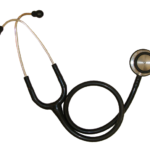 Anorexia nervosa is one of the eating disorders. It is associated with the way one’s weight is being experienced. The person usually an adolescent or young adult female (but it may occur at any age or sex) has an intense fear of weight gain or becoming fat even when she is underweight. She refuses to gain weight and would downplay the seriousness of her current low weight if challenged. Patients with anorexia nervosa also engage in recurrent episodes of binge eating.
Anorexia nervosa is one of the eating disorders. It is associated with the way one’s weight is being experienced. The person usually an adolescent or young adult female (but it may occur at any age or sex) has an intense fear of weight gain or becoming fat even when she is underweight. She refuses to gain weight and would downplay the seriousness of her current low weight if challenged. Patients with anorexia nervosa also engage in recurrent episodes of binge eating.
 The cause is largely unknown however with regards to prognosis about 50% tend to recover, 35% improve, 15% become chronic and 5% die within 10 years (Pepid)
The cause is largely unknown however with regards to prognosis about 50% tend to recover, 35% improve, 15% become chronic and 5% die within 10 years (Pepid)
Some of the symptoms exhibited may include loss of menstruation, cold intolerance, constipation, fear of weight gain and excessive exercise in an attempt to lose weig ht.
ht.
Many patients with Anorexia nervosa also feel cold often, have a low blood pressure, slow heart rate or irregular heart rate.
Some patients develop a fine silky body hair called Lanugo hair similar to that of premature babies. They may also have dry skin, swelling of the legs and general growth delay.
Blood work might show anemia, low blood sugar, electrolyte imbalance, hypoalbuminemia, elevated amylase, low LH/FSH ratio.
 There may also be decreased bone density and occasional ventricular tachyarrhythmia and prolonged QT on ECG.
There may also be decreased bone density and occasional ventricular tachyarrhythmia and prolonged QT on ECG.
Treatment
A multi-disciplinary approach is recommended and the patient should be  confronted in a gentle manner. Usually, medication has been found to be not very useful. Psychotherapy (Cognitive Behavioral Therapy) has also not been found to be very effective for the treatment of anorexia nervosa
confronted in a gentle manner. Usually, medication has been found to be not very useful. Psychotherapy (Cognitive Behavioral Therapy) has also not been found to be very effective for the treatment of anorexia nervosa
The patient should be told about complications, attempts should be made to address any psychological stressors, self-esteem problem and difficult family situation. These patients are usually managed by specialists.